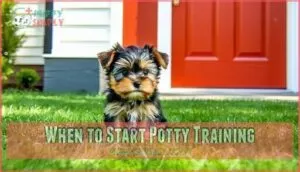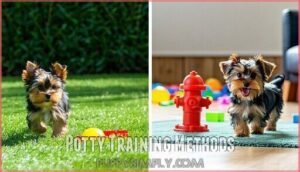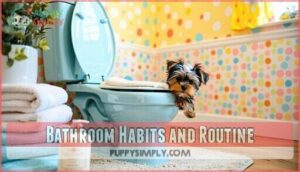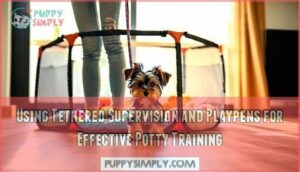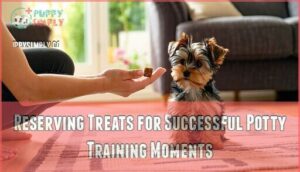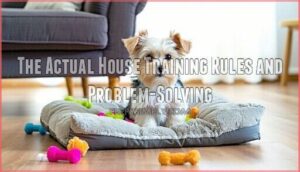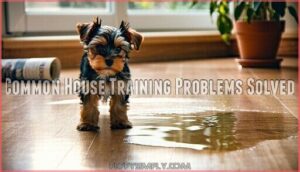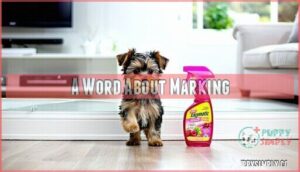This site is supported by our readers. We may earn a commission, at no cost to you, if you purchase through links.

Starting at 8-12 weeks works best, when they’re most alert and ready to learn. Factors like your training method, living situation, and your Yorkie’s personality all influence the timeline.
Pet store puppies often need extra patience compared to breeder-raised ones. The good news? Yorkies are intelligent and keen to please once you find the right approach.
Their small bladders mean more frequent breaks, but outdoor training succeeds for 68% of owners. Success depends on establishing routines and staying patient through those inevitable accidents.
Table Of Contents
- Key Takeaways
- Potty Training Duration and Variability
- When to Start Potty Training
- Potty Training Methods
- Yorkie’s Ease of Housetraining
- Bathroom Habits and Routine
- Supervision and Containment Methods
- Be Prepared to Give Praise and Reward
- The Actual House Training Rules and Problem-Solving
- Common House Training Problems Solved
- A Word About Marking
- Frequently Asked Questions (FAQs)
- How long does it take to potty train a Yorkie?
- When should Yorkies start potty training?
- Can a Yorkie be potty trained?
- When should you start training a Yorkie puppy?
- Can You potty train a Yorkie on puppy pads?
- How do you train a Yorkie puppy?
- What are the best ways to housebreak a Yorkie?
- How much time does it take to potty train a Yorkie?
- What is the best age to start potty training a Yorkie?
- What are some tips for dealing with accidents?
- Conclusion
Key Takeaways
- Most Yorkies need 4-6 months to master potty training basics, though some take up to a year, depending on your consistency and their personality.
- Start training at 8-12 weeks old when they’re most alert and ready to learn – this early window gives you the best chance for success.
- Your consistency matters more than their stubbornness – maintaining regular bathroom breaks, using the same cue words, and sticking to routines accelerates the process significantly.
- Expect more frequent breaks due to small bladders – puppies need trips outside every 30-60 minutes during active periods, plus immediately after meals, naps, and playtime.
Potty Training Duration and Variability
Potty training your Yorkie doesn’t happen overnight, and you’ll find that several factors affect how quickly your pup catches on.
While most Yorkies master the basics in 4-6 months, some may need up to a year depending on their age, consistency of training, and individual personality.
Factors That Influence The Duration of Potty Training
Several factors shape how quickly your Yorkie masters potty training.
Breed differences matter less than individual traits, but puppy age substantially impacts bladder control development.
Training consistency proves vital – daily routine disruptions can extend the process by weeks.
Environmental factors like apartment living versus yard access also influence success.
Your Yorkie puppy’s maturity level affects their ability to understand and follow potty training age milestones consistently, and training consistency is key to achieving this.
Average Timeline for Potty Training a Yorkie
Your Yorkie’s potty training timeline typically spans 2-6 months, depending on consistency and age influence.
Most yorkies grasp basic concepts within the first few weeks, but accident-free behavior takes longer.
Here’s what affects training duration:
- Puppy training requires 4-6 months for complete mastery
- Routine impact dramatically speeds up the process
- Breed tendencies favor quick learning with proper guidance
- Consistency importance can’t be overstated for success
Variability in The Speed of Potty Training
Not every Yorkie follows the same potty training timeline.
Owner consistency plays the biggest role in success rates, while puppy temperament and environmental factors create natural variations.
Some yorkies master potty training in just two months, others need closer to a year.
Breed differences matter less than your dedication to consistent training methods and realistic expectations for your individual pup.
When to Start Potty Training
You’ll want to start potty training your Yorkie puppy between 8 and 12 weeks of age when they’re most alert and ready to learn.
Starting early gives you the best chance for success, though dogs from pet stores may need extra patience since they often lack the foundation training that responsible breeders provide, which is crucial for effective potty training.
Ideal Age to Begin Potty Training a Yorkie
Most Yorkie puppy training begins between 8-12 weeks old when puppies show clear readiness signs like alertness and keenness to learn.
Starting at eight weeks gives you early start benefits, helping establish developmental milestones before bad habits form.
Your puppy’s breeder influence matters too – well-socialized pups often adapt faster to your puppy training schedule, proving age vs. success isn’t everything, and highlighting the importance of readiness signs.
Considerations for Pet Store Dogs and Breeder Dogs
Where you get your Yorkie puppy affects when you’ll start yorkie potty training.
Pet store environment conditions often create challenges that require immediate attention, while breeder socialization provides better foundations.
Here’s what to keep in mind for each source:
- Pet store puppies – Start housebreaking immediately since they’ve likely developed poor habits from cage living
- Breeder dogs – Begin Yorkie puppy training around 8 weeks with established routines already in place
- Health guarantees – Verify genetic predispositions that might affect puppy training timelines before starting
Early training works regardless of origin.
Advantages of Starting Potty Training Early
Early yorkie potty training delivers faster results and prevents accidents from becoming habits.
Starting between 8-12 weeks establishes routine when puppies are most receptive to learn. This window makes housebreaking easier since young minds absorb new concepts quickly.
Early puppy training strengthens your bond through consistent positive interactions, setting both you and your Yorkie up for long-term success.
A vital aspect involves recognizing elimination cues to anticipate your puppy’s needs, which is crucial for long-term success and helps in preventing accidents.
Potty Training Methods
You’ve got several potty training paths to choose from when housebreaking your Yorkie, each with unique benefits and challenges.
The method you pick depends on your living situation, schedule, and your pup’s specific needs.
Different Approaches to Potty Training a Yorkie
Once you’ve decided to start potty training, choosing the right approach for your Yorkie makes all the difference.
Each method has its strengths:
- Indoor vs. Outdoor – Perfect for apartment living or harsh weather conditions
- Pad Training – Gives you control when outdoor access isn’t always possible
- Crate Training – Works with your dog’s natural den instincts
- Hybrid Approach – Offers the freedom to adapt as your pup grows
Schedule Adherence remains key regardless of which yorkie potty training method you pick.
Pros and Cons of Each Method
Each training method offers unique benefits and challenges.
Crate Training reduces accidents by 80% but can cause anxiety if overused. Pad Training helps apartment dwellers but creates confusion in 55% of cases.
Outdoor Training achieves faster housebreaking in 68% of yorkies but requires consistent access. Hybrid approaches balance flexibility with potential mixed signals.
Consistency remains your secret weapon regardless of method choice.
Choosing The Method That Works Best for Your Yorkie
Since every dog is unique, finding your Yorkie’s ideal potty training method requires thoughtful method comparison.
Consider your lifestyle factors first—apartment dwellers might prefer pad training, while homeowners lean toward outdoor methods. Your Yorkie’s personality matters too; some respond better to indoor consistency, others to outdoor adventures.
Don’t hesitate to try trial and error with different yorkie training tips until something clicks. Positive reinforcement, like rewarding successful breaks, is essential for progress.
Professional guidance can fast-track your yorkie house training success when DIY approaches stall, and this is where expert advice can be invaluable.
Yorkie’s Ease of Housetraining
You’ll find that Yorkies aren’t inherently harder to housetrain than other breeds, though their small size means they need more frequent bathroom breaks.
With consistent training and patience, most Yorkies can master the basics within 4-6 months, making them surprisingly manageable for new dog owners.
Characteristics of Yorkies That Make Them Relatively Easy to Train
Several factors make Yorkies surprisingly trainable despite their small size.
Their intelligence levels rank above average among toy breeds, allowing them to learn commands quickly with puppy training patience.
This Yorkie puppy’s adaptability shines when you establish clear routines early.
Their affectionate nature and willingness to please create strong trainability factors that respond well to yorkie training advice emphasizing positive reinforcement over harsh corrections.
Importance of Consistent Training for Faster Learning
Three key principles drive faster yorkie potty training success. Consistency prevents confusion and builds reliable habits through routine benefits.
- Establish a yorkie potty schedule with regular breaks every 2-3 hours
- Use clear communication with the same cue words like "go potty"
- Apply positive reinforcement immediately after successful elimination
Early establishment of these puppy training consistency rules accelerates your yorkie potty training timeline substantially.
Age Considerations for Potty Training a Yorkie
Age matters substantially when potty training your Yorkie puppy.
Young puppies between 8-12 weeks learn fastest with consistent routines, though their bladder control remains limited.
Adult Yorkies over six months possess better physical control but may resist housebreaking changes.
Senior dogs need patience as age-based training requires gentle approaches.
Puppy accidents decrease as learning stages progress, making early training ideal for long-term success.
Spaying or neutering can improve training by reducing marking and humping to enhance housebreaking and overall behavior.
Bathroom Habits and Routine
Understanding your Yorkie’s bathroom needs is key to successful potty training.
A consistent routine helps your puppy learn when and where to go, making the entire process smoother for both of you.
Frequency of Bathroom Breaks for Puppies and Adult Dogs
Your Yorkie puppy’s bathroom schedule depends on their age and puppy bladder control abilities.
Young puppies need bathroom breaks every hour, while adult dogs can wait longer between trips.
Here’s what you need to know about break time intervals:
- Puppy schedules: Take your Yorkie puppy outside every 30-60 minutes during active periods, plus immediately after meals, naps, and play sessions
- Adult dog schedules: Mature Yorkies can handle 3-5 hour intervals between potty breaks throughout the day
- Nighttime potty needs: Puppies may need one midnight trip, while adults can typically sleep through the night
Weather impact shouldn’t derail your potty schedule – consistency beats comfort when potty training yorkie puppies successfully.
Establishing a Consistent Routine for Bathroom Breaks
Two words reveal successful yorkie housebreaking: routine and consistency. Your puppy thrives when bathroom breaks happen like clockwork, making potty training yorkie efforts more predictable and effective.
| Time of Day | Scheduled Potty Breaks |
|---|---|
| Morning | First thing upon waking |
| After meals | 15-30 minutes post-feeding |
| Mid-day | Every 2-3 hours for puppies |
| Evening | Before bedtime routine |
| Nighttime | As needed for young pups |
Use consistent cue words like "go potty" every single time. Factor in weather considerations and nighttime potty needs when establishing your schedule. This travel potty routine becomes second nature, transforming housebreaking yorkie challenges into manageable milestones through unwavering consistency.
Adjusting The Routine Based on The Yorkie’s Needs and Age
Routine flexibility becomes essential as your Yorkie puppy grows and changes.
Young puppies need frequent breaks due to limited puppy bladder control, but you’ll adjust timing as they mature.
Growth spurts may temporarily affect their schedule, while senior Yorkie needs require different considerations.
Monitor for illness adjustments and adapt your potty training approach accordingly for ideal results.
Supervision and Containment Methods
When potty training your Yorkie, proper supervision and containment become your best allies for preventing accidents.
You’ll want to keep your pup within eyesight at all times during the early training phase, using tools like tethers and playpens to create manageable boundaries while they learn the ropes.
Using Tethered Supervision and Playpens for Effective Potty Training
Vigilant supervision creates the foundation for successful Yorkie puppy training. When you can’t watch your puppy like a hawk, tethered supervision and playpens become your best friends for preventing accidents before they happen.
Here’s how these methods work together:
- Tethered Supervision keeps your Yorkie puppy within arm’s reach, making quick trips outside effortless when you spot elimination signals
- Playpen Benefits include creating safe zones where accidents won’t damage your floors while giving your puppy room to move around
- Gradual Freedom means slowly expanding your puppy’s access to different rooms as puppy training progresses and reliability improves
- Preventing Accidents becomes easier when puppy confinement limits opportunities for mistakes in unsupervised moments
Smart puppy supervision means you’re always ready to redirect your Yorkie to the right spot. A well-sized puppy playpen positioned conveniently lets you maintain control without constant stress. A useful tool for this is a puppy training tether.
Avoiding The Use of Crates for Housebreaking
Why confine your Yorkie when freedom works better?
Over 60% of owners successfully housetrain their Yorkies without crates using playpen alternatives and tethered supervision.
This potty training guide emphasizes constant monitoring over containment—your Yorkie learns faster with alternative containment methods like baby gates.
These housebreaking training methods reduce stress while maintaining effective boundaries during your yorkie potty training journey.
Setting Up a Suitable Indoor Confinement Area for The Yorkie
Instead of traditional crate training, create a safe space using a puppy playpen that’s appropriately sized for your Yorkie puppy.
Position puppy pads in one corner with cleaning supplies nearby for quick accidents.
Include safe toys and make certain of proper pad placement away from food areas.
This setup provides freedom while maintaining boundaries for successful indoor training.
Be Prepared to Give Praise and Reward
Positive reinforcement is the cornerstone of successful Yorkie potty training, so you’ll want to have high-value treats and enthusiastic praise ready at all times.
The moment your Yorkie finishes eliminating in the right spot, reward them immediately to create that vital mental connection between the behavior and the reward.
Importance of Praise and Rewards in Potty Training
Timing matters when rewarding your Yorkie puppy. Your praise and positive reinforcement create the foundation for successful potty training.
Here’s how to maximize your reward system:
- Immediate praise – Say "good potty" the moment they finish
- High-value treats – Use special rewards reserved only for potty success
- Verbal praise – Keep your voice excited but not overwhelming
- Affection rewards – Add gentle petting to reinforce the behavior
- Reward consistency – Every family member should follow the same approach
Your Yorkie learns faster when they connect the reward with the action instantly.
Choosing The Right Rewards for Positive Reinforcement
Selecting effective rewards makes your Yorkie puppy enthusiastic to repeat good potty training behavior. High-value treats work best, but don’t overlook verbal praise and affection rewards either.
| Reward Type | Best Options | Why It Works |
|---|---|---|
| Treat Variety | Small, soft training treats or freeze-dried liver | Quick to eat, high motivation value |
| Verbal Praise | "Good potty!" in excited, happy voice | Builds strong association with success |
| Affection Rewards | Gentle pets, belly rubs, or brief play | Strengthens your bond during positive reinforcement |
Mix different puppy training rewards to keep your Yorkie interested. Some dogs respond better to dog treats, while others prefer toy rewards or praise.
Positive reinforcement relies on operant conditioning principles.
Reserving Treats for Successful Potty Training Moments
Strategic timing turns treats into training gold. Reserve high-value treats exclusively for successful potty moments to maximize their impact on your Yorkie puppy’s learning.
- Treat Timing: Give rewards immediately after elimination, not during or before
- High-Value Treats: Use irresistible options like freeze-dried liver or chicken bits
- Treat Size: Choose tiny pieces that won’t disrupt training flow or upset stomachs
- Reward Variety: Rotate different flavors to maintain excitement and prevent boredom
Consider purchasing premium reward options for ideal results.
The Actual House Training Rules and Problem-Solving
Now you’ve mastered the foundation of Yorkie potty training, it’s time to implement the essential rules that will make or break your success.
These core principles will help you handle accidents properly and solve the most common training challenges that trip up even experienced dog owners, including how to handle accidents.
Key Rules to Follow During Potty Training
Success begins with establishing clear potty training rules for your Yorkie. Consistency matters most during puppy training, so stick to your schedule no matter what.
Follow these essential guidelines:
- Schedule Adherence – Take your Yorkie outside immediately after meals, naps, and playtime
- Supervise Closely – Watch for sniffing or circling behaviors that signal bathroom needs
- Positive Reinforcement – Praise enthusiastically when your pup eliminates in the right spot
Clean accidents thoroughly with enzymatic cleaners to prevent repeat marking. Patience transforms even the most stubborn Yorkie into a house-trained companion.
Reacting to Accidents and Addressing Common Problems
When accidents happen, stay calm and avoid punishment. Immediately interrupt with a gentle "no" and redirect your Yorkie outside.
Stay calm during accidents – redirect to the right spot, not punishment
Clean accidents promptly to prevent repeat marking. Consistency and patience beat frustration every time.
If yorkie potty accidents persist despite schedule adjustment, consider medical issues and seek professional help for ongoing yorkie potty problems, remembering that consistency is key.
Proper Cleaning to Eliminate Lingering Scents
When yorkie potty accidents happen, quick action prevents repeat offenses.
Dogs return to spots that smell like their previous bathroom breaks, making thorough cleaning your best defense.
Here’s your cleaning game plan:
- Blot immediately – Soak up fresh accidents with paper towels before they set in
- Apply enzymatic cleaner – These products break down odor-causing proteins that regular cleaners miss
- Wait and repeat – Let the product sit for 10-15 minutes, then clean again if needed
- Increase cleaning frequency – Clean accident spots daily until your Yorkie stops returning to them
The right enzymatic cleaner eliminates scents your nose can’t detect but your Yorkie’s powerful sniffer finds irresistible.
You can find these cleaners at many retailers.
Without proper odor removal, you’re fighting an uphill battle against scent marking behaviors.
Common House Training Problems Solved
Even experienced dog owners face challenges when housetraining their Yorkie, but most problems have straightforward solutions.
You’ll learn practical fixes for the most frustrating issues, from indoor accidents after outdoor potty breaks to territorial marking behaviors, and find solutions to issues like indoor accidents.
Solutions for Common Challenges in Potty Training
When potty training challenges arise, don’t panic. A firm "No" and hand clap stops accidents in progress, but avoid harsh punishment.
Clean thoroughly with enzymatic cleaners to prevent repeat offenses.
Key strategies:
- Accident Regression often signals stress or inconsistent signals—review your routine
- Nighttime Accidents decrease with consistent bedtime potty breaks and water restriction
- Separation Anxiety can trigger indoor marking—practice short departures first
Patience beats frustration every time.
Addressing Issues Like Peeing After Coming Back Inside or Marking
Dealing with post-potty accidents requires understanding why they happen. Your Yorkie mightn’t fully empty their bladder outside due to distractions or anxiety peeing triggers.
- Monitor immediately after outdoor trips – Watch for sniffing or circling behaviors that signal another bathroom need
- Use enzymatic cleaners for scent elimination – Standard cleaners leave traces that encourage marking behavior and repeat accidents
- Address marking behavior quickly – Redirect your Yorkie and limit access to previously soiled areas until consistency improves
Restricting Access to The Entire House Until Fully House Trained
Think smart about giving your Yorkie full house freedom. Limited Space Benefits mean starting with one room helps prevent accidents and builds confidence.
Gradual Freedom Increase works better than overwhelming them with choices.
| Stage | Access Level |
|---|---|
| Week 1-2 | Kitchen/bathroom only |
| Week 3-4 | Add living room |
| Week 5-6 | One bedroom access |
| Week 7-8 | Upstairs hallway |
| Week 9+ | Full house freedom |
Supervised Exploration lets you catch mistakes early. Preventing Accidents becomes easier when you control their environment.
Consistent Boundaries during housebreaking create yorkie training success faster than crate training yorkie alone. Your puppy training succeeds through patience, not rushing potty training progress.
A Word About Marking
Beyond regular housebreaking challenges, marking presents a distinct territorial behavior that requires different strategies.
Unlike accidental elimination, marking involves small amounts of urine deposited on vertical surfaces.
- Marking definition: Territorial scent-marking behavior, typically involving small urine amounts on walls or furniture
- Causes of marking: Unneutered males, territorial instincts, stress, or new environments trigger this yorkie behavior
- Preventing marking: Spaying/neutering substantially reduces marking tendencies in most dogs
- Cleaning marked spots: Use enzymatic cleaners to eliminate scent traces that encourage repeat marking
When to worry: Persistent marking despite proper housebreaking suggests addressing underlying territorial issues beyond standard Yorkie potty training methods.
Frequently Asked Questions (FAQs)
How long does it take to potty train a Yorkie?
Most Yorkies need 6-12 months to become fully housebroken, though you’ll see progress within the first two months. Their small bladders and stubborn streak require patience and consistent training routines.
When should Yorkies start potty training?
Start potty training your Yorkie between 8-12 weeks old when they’re alert and keen to learn.
Don’t wait longer—early training builds good habits faster and prevents stubborn behaviors from developing.
Can a Yorkie be potty trained?
Yes, Yorkies can definitely be potty trained.
While they’re small and energetic, making training challenging, consistency and patience lead to success.
Most Yorkies master potty training within six to twelve months with proper techniques.
When should you start training a Yorkie puppy?
You can begin potty training your Yorkie puppy as early as eight weeks old, when they’re alert and keen to learn new routines and commands effectively.
Can You potty train a Yorkie on puppy pads?
Pad training works well for Yorkies, especially in apartments or harsh weather. Place pads in a consistent spot, use verbal cues, and reward success immediately.
How do you train a Yorkie puppy?
Training a Yorkie puppy requires consistency, patience, and positive reinforcement.
Establish a routine with frequent potty breaks, use designated spots, reward success immediately with treats and praise, and supervise closely to prevent accidents.
What are the best ways to housebreak a Yorkie?
Like Rome wasn’t built in a day, your Yorkie won’t master housebreaking overnight.
Establish consistent routines, choose designated potty spots, use positive reinforcement immediately after success, watch for warning signs.
Maintain patience throughout the process.
How much time does it take to potty train a Yorkie?
You’ll need about 4-6 months to potty train your Yorkie. Most puppies grasp the basics within two months, but consistent, accident-free behavior typically takes longer to achieve.
What is the best age to start potty training a Yorkie?
When should you begin this journey with your furry friend? Start potty training your Yorkie between 8-12 weeks old, when they’re alert and ready to learn new habits consistently.
What are some tips for dealing with accidents?
Don’t panic when accidents happen—they’re part of the process.
Clean immediately with enzymatic cleaner to eliminate odors completely.
Avoid punishment and instead focus on identifying patterns to adjust your training schedule accordingly.
Conclusion
Remember Rome wasn’t built in a day, and your Yorkie won’t master potty training overnight either.
How long does it take to potty train a yorkie? Expect 4-6 months on average, though some determined pups need up to a year.
Your consistency trumps their stubbornness every time. Stay patient through accidents, maintain your routine, and celebrate small victories.
With the right approach and plenty of praise, you’ll both reach the finish line successfully.

